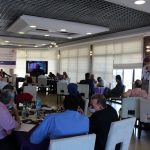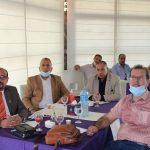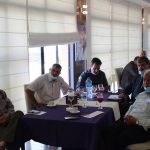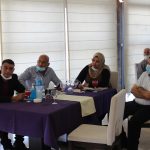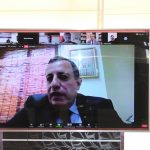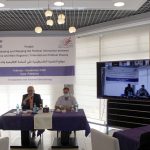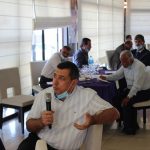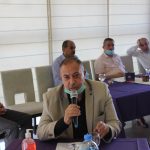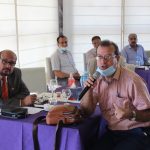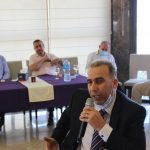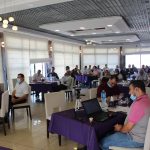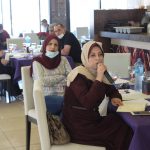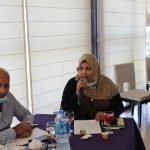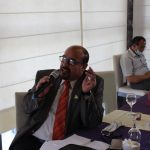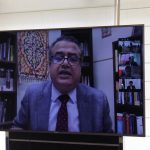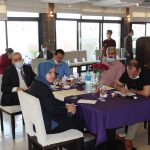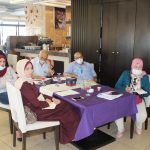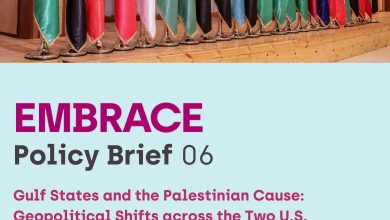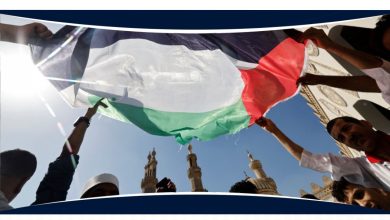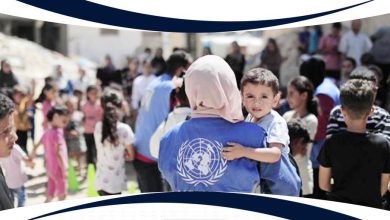Palestinian Policies in Light of the Current Challenges: Roundtable Discussion
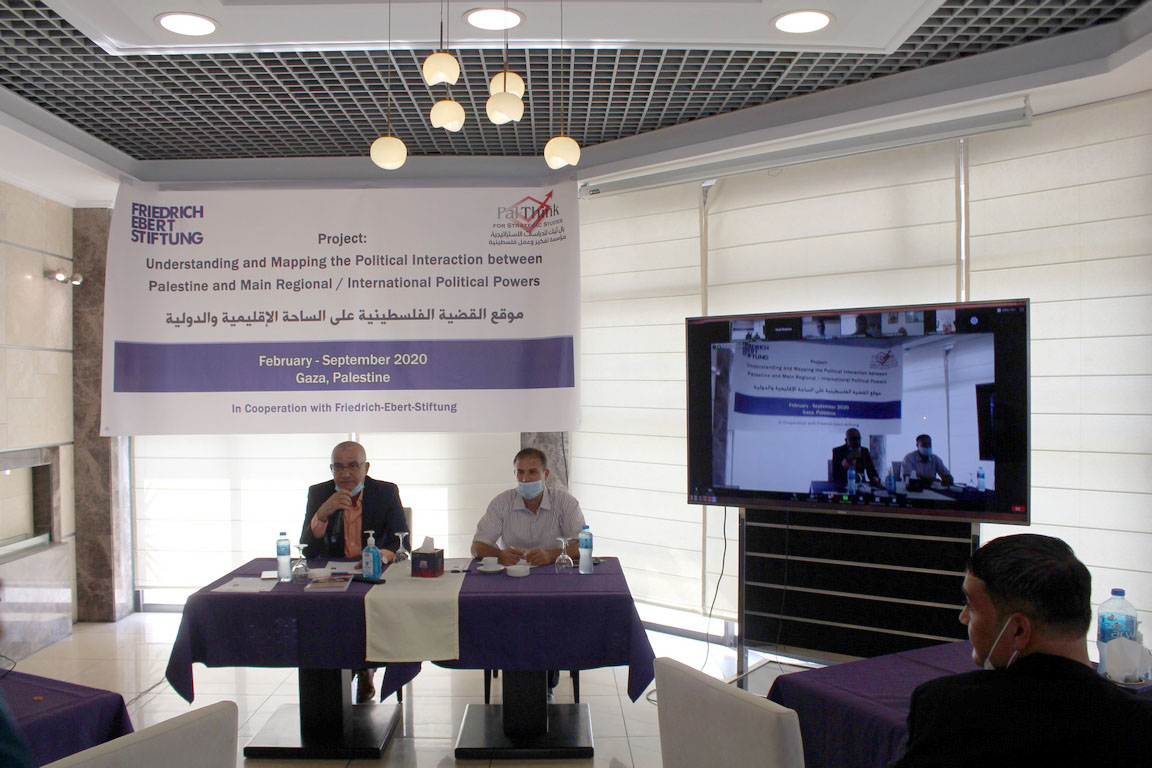
In partnership with Friedrich-Ebert-Stiftung, Pal-Think for Strategic Studies held a virtual roundtable discussion which urged political decision-makers in Palestine to reactive the Palestinian Liberty Organization and to establish a modern system for the Palestinian people, and to plan on advancing a strategy to confront pressing challenges.
Through the discussion titled “Palestinian Policies in Light of the Current Challenges”, Pal-Think hosted Dr. Ahmad Azm, professor in Birzeit University, and the Political Advisor for the Palestinian Prime Minister, and Dr. Ibrahim Fraihat, professor of international conflicts at the Doha Institute for Graduate Studies and Georgetown University.
Thinking Corners and Good Policy-Making
An elite group of academics, researchers, and representatives from the CSOs physically attended the roundtable discussion which was moderated by Mr. Omar Shaban, Director of Pal-Think for Strategic Studies. Through Zoom, another group of attendees joined and raised several questions for the hosted speakers.
Mr. Omar explained that the aim of the discussion was to map and analyze the challenges of the Palestinian cause and to provide alternatives for decision-makers to cope with the emerging hurdles, pointing out that research centers propose recommendations that contribute to making good policies. In addition, he signaled that the event encourages the art of dialogue and discussion.
Director of Friedrich Ebert in Gaza, Dr. Osama Antar, commended the effort exerted by Pal-Think in triggering the political discussion, constructive thinking, encouraging the art of discussion, proposing strategic, intellectual, good, and political visions through its events.
Antar said that Friedrich and Pal-Think partner to implement unique programs that connect Palestine with the world.
“National Cause”… Challenges
Prof. Ahmad, personally, said that there is a set of challenges that faces that Palestinian national cause some of which are the lack of vision, the Arab-Israeli normalization, the chaos the Palestinian people suffers from (refuges), in addition to other political, economic, educational problems, etc… .
He believed that to exit the current crisis is to “reset factory” for the PLO, meaning that the Organization has to be maintained. However, there has to be some amendments to be empowered again.
He mentioned that the PLO, which has a historical and legal record, has to be reactivated, disagreeing with some political opinions suggesting to neglect the role of the PLO or to find a replacement for it. He stresses that the Organization has been established after giving a lot of sacrifices and it has not emerged overnight.
He emphasized that amending and restoring leading role of the Organization requires to adopt the previous vision of the PLO, or to find a modern system capable of engaging the Palestinian people in decision-making.
He said that reactivation of the PLO can achieve a lot of goals for the Palestinian cause including the engagement of promising youth in the political participation which all in all will guarantee the sustainability of convening meetings in the PLO.
Contemporary Educational and Economic System
In the context, Prof. Ahmad pointed out that the Palestinian scene suffers from many economic and educational problems, as the Palestinian economy suffers from many distortions, as it is a non-rentier and non-pastoral economy, indicating that the economy in Palestine requires the development of a political and economic strategy and education that harmonizes the language of the digital age and the current “Data Era”.
Azm called for the reconstruction of education in Palestine to match the requirements of the digital age and the age of data, noting that the world is more interested in competencies, skills and practical experiences than scientific certificates.
Absence of vision
For his part, Dr. Ibrahim Fraihat, professor of international conflicts at the Doha Institute for Graduate Studies and Georgetown University, explained that the Palestinian national project is in real trouble; Because of three main problems (absence of vision, lack of strategy, leadership crisis).
Fraihat stated that the first problem is the absence of the “vision,” saying: The Palestinians had a vision during the Balfour Declaration, and then they rejected the partition plan in 1947, and there was a vision that was to preserve the entire Palestinian soil, from the river to the sea, and the Arab military intervention as a method to achieve That said, in the presentation of the interim program in 1947, a shift occurred in the goal, but there remained a vision that says establishing the state on the part that is liberated while armed struggle remains the only way for liberation. In 1993, despite its badness, the Oslo accord represented a vision regardless of whether we agreed with it or not, and provided for the establishment of the state on the 1967 borders, and negotiations are a way to reach that.
Fourth Model of Confrontation
He pointed out that the second problem is the “crisis of militant strategy”, as the Palestinian struggle went through three models in which different strategies were used, the first model: the armed struggle in the year 1965, which was considered during that stage to be the only and inevitable way to liberate Palestine, and the development of that second model after the 1982 war to 1987 with the model of the people’s war of liberation, and after that came the third model in 1993 represented by negotiations.
He mentioned that the third version of negotiations had expired long ago due to its dependence on the international system and the United States and its dependence on the principle of good intentions, stressing that the current reality needs the fourth version, which is an improved version of (the second version and the third version), which combines the development of popular resistance and peaceful political work.
Means of Confrontation
He indicated that the weapons and battlefields in the present have changed, as the battle is no longer fought in the dens of Shuja’iya, or Jabalia camp, or the streets of al-Fawwar camp in Hebron, but now there are new arenas such as national and international arenas and universities in all countries of the world.
He continued saying: means of resistance has changed now from Kalashnikovs to “Twitter” and “YouTube”, and the emotional and revolutionary speeches have been replaced by the scientific article of a house with evidence, noting that Israel used different platforms on social media to convince Arabs to normalize.
Leadership Crisis
As for the third problem, from Fraihat’s point of view, it is the “leadership crisis,” as he believes that the leaders of the Palestinian people are divided, and no framework unites them until the moment, indicating that the solution to the third side of the crisis is to rebuild the PLO in order to form the future leadership.
He added that the challenges facing the Palestinian cause force the Palestinians to establish a national and clear strategy.
Normalization is not a Major Blow
Regarding the Arab normalization, Fraihat believes that normalization did not constitute a fatal blow to the national project, since the normalizing Arab countries did not provide support leading to liberation, recalling that Arab support was limited to financial and political support, and that neither of them liberated land nor restored a right.
Fraihat called on the Palestinian leadership to think carefully about working in other arenas and areas within the countries that normalized with the occupation, and not to impose a boycott with those countries so that Israel would not dominate in all areas.

